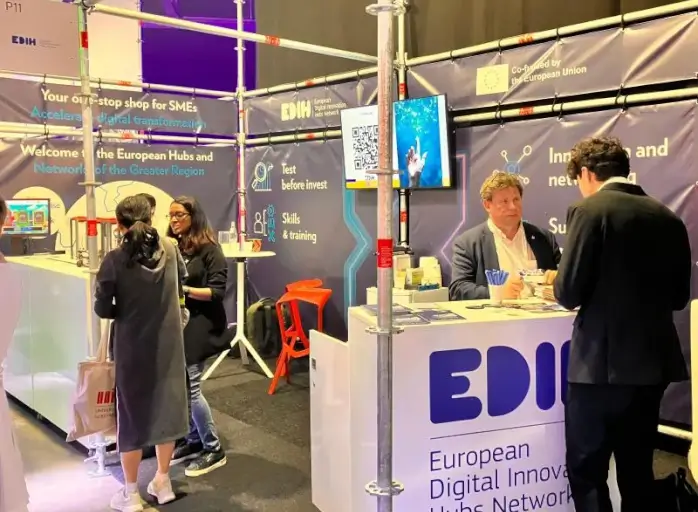


Luxinnovation co-organised a hybrid business forum for the wood sector during the just concluded official trade mission to Latvia with the aim to facilitate exchanges between the Luxembourg wood companies and representatives from the Latvian wood sector.
 Abigail Okorodus
Abigail Okorodus
The state visit to Latvia’s capital, Riga, commemorates 100 years of Latvia-Luxembourg diplomatic relations celebrated last year. Around 120 individuals from Luxembourg and Latvian companies participated in the B2B sessions that took place during the official three-day visit organised by the Chambre de Commerce, in collaboration with the Ministry of the Economy, from 13 to 15 March 2023.
His Royal Highness, the Grand Duke of Luxembourg, Minister of the Economy Franz Fayot, Luxembourg-based companies, and Luxinnovation representatives were among the Luxembourg delegation that travelled to Latvia for the visit, which focused on the digital and sustainable economy, as well as the wood sector. The business forum and the wood sector workshop were intended to reinforce economic cooperation and business relations.
 “Considering that about 19% of Latvia’s exports are linked to raw wood and wood products, the development of synergies between the two sectors can be fundamental, as Luxembourg imports a large quantity of such products,” explained Ralf Köhler, Luxembourg Wood Cluster Manager at Luxinnovation. He supports the national wood sector which includes over 1,300 companies that provide around 19,000 jobs.
“Considering that about 19% of Latvia’s exports are linked to raw wood and wood products, the development of synergies between the two sectors can be fundamental, as Luxembourg imports a large quantity of such products,” explained Ralf Köhler, Luxembourg Wood Cluster Manager at Luxinnovation. He supports the national wood sector which includes over 1,300 companies that provide around 19,000 jobs.
The Luxembourg Wood Cluster focuses on increasing the sector’s potential, promoting business development, as well as on stimulating innovation and the digitalisation of the value chain.
The wood sector workshop took place over a live link, with over 20 participants connected at the Chamber of Commerce’s premises in Luxembourg and in Latvia.
The workshop’s programme featured brief company presentations by several businesses, which highlighted their activities, products and services that reflect innovative production and building trends, wood construction approaches, novel and sustainable furniture manufacturing and design, modern equipment for timber construction, logistics and remote sensing for better forest data and inventory. Presentations on the intersection of the wood sector and finance were also given by the Forestry and Climate Change Fund in Luxembourg, as well as other presentations by the dedicated furniture producers association in Latvia and the forestry administrations in both countries.
“The use of sustainable wood products is one of the strategic goals of the national climate and energy plan. The forestry sector in Luxembourg is committed to sustainable forest management, given that forests represent a high share of land use,” stated Frank Wolter, director of the National Nature and Forestry Agency.
Latvia’s know-how in the prefabrication of modular timber also plays an important role for innovative timber construction. Companies from the sustainable construction industry on both sides pointed out that modular timber is a highly interesting product, particularly due to its circular use and deconstructability.
 The second part of the workshop was dedicated to science, technology, and research interventions with presentations from the engineering and composite structures department of the University of Luxemburg’s Faculty of Science, Technology and Medicine (FSTM), the Latvian University of Life Sciences and Technology, and the Latvian Council of Science. This part of the workshop also delved into the Horizon Europe programme and activities by the national contact points, Luxinnovation and the Latvian Council of Science.
The second part of the workshop was dedicated to science, technology, and research interventions with presentations from the engineering and composite structures department of the University of Luxemburg’s Faculty of Science, Technology and Medicine (FSTM), the Latvian University of Life Sciences and Technology, and the Latvian Council of Science. This part of the workshop also delved into the Horizon Europe programme and activities by the national contact points, Luxinnovation and the Latvian Council of Science.
“Forestry and wood are top research areas for Latvia,” explained Lauma Muižniece from the Latvian Council of Science.
Both Luxembourg and Latvian participants expressed a strong interest to collaborate through joint consortium partnerships within the framework of the Horizon Europe programme. Throughout the workshop, companies had the opportunity to ask questions, exchange experiences, share contacts, and discuss future expectations and areas of common challenges.
“There will be a follow-up with our Latvian counterparts after this business forum to deepen the concrete economic interests of the actors involved, support useful economic cooperation, and push innovation that will boost the competitiveness, digitalisation and sustainability of the sector inside the European Union,” said Mr Köhler.
Photo credit: Luxinnovation